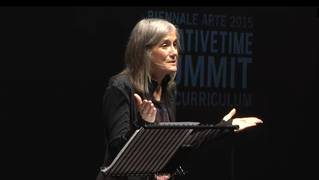
Topics
By Amy Goodman and Denis Moynihan
VENICE, Italy — This historic city, famous for its canals and its sonorous gondoliers, its stunning museums brimming with art, where tens of thousands stroll the wide Piazza San Marco and wander its maze of narrow alleys, hosts the world’s oldest and most prestigious art biennial, the Venice Biennale. Every two years, artists from around the world showcase their work in scores of venues — some national pavilions sponsored by countries from around the globe; others international or independent exhibits. High art may seem a rarified field when the world is consumed by war, climate catastrophe, mass migrations and growing economic inequality. Art may seem a luxury as people of color are gunned down by police in American streets. This year’s Biennale, though, explodes these myths.
Okwui Enwezor of Nigeria is the Venice Biennale’s first African-born curator. Enwezor has been widely credited for bringing political art back to the 120-year-old festival. He says he was partly inspired by the 1974 Biennale, when part of the exhibits were dedicated to Chile, to protest the U.S.-backed coup of Gen. Augusto Pinochet that overthrew Chile’s democratic government. Exhibits that Enwezor has brought to this Biennale include an epic live reading of Karl Marx’s “Das Kapital,” the Brazilian artist Vik Muniz’s piece, a boat covered in the front page of a Venice newspaper published the day after nearly 400 migrants drowned off the Italian island of Lampedusa in October 2013, and Iceland’s controversial pavilion, where an actual mosque was created in a church that had been empty for more than 40 years. The city of Venice shut down the mosque, citing security concerns.
“Today’s artists are doing much more than providing a mirror,” Anne Pasternak of the organization Creative Time told us at one of the Biennale’s main venues, the Arsenale. “They’re getting into the gritty work of actual social change.” Creative Time, a New York-based nonprofit that commissions and supports public art and engagement, convened a three-day summit at this year’s Biennale. Hundreds of artists, activists, scholars and others gathered in the 16th-century Teatro alle Tese, part of Venice’s Arsenale. The Arsenale is a vast, ancient walled complex where Venetians built the warships that powered their military dominance in the Mediterranean Sea for centuries. As far back as the 1500s, they could build a warship in one day in what is said to have been the world’s first industrial assembly line.
Now, the complex is given over to art, theater, music and public discussion, turning swords into plowshares. Among those presenting at the summit was Mariam Ghani, an Afghan-American artist based in Brooklyn, N.Y., who conducted from the stage a video-streamed conversation with her father, Ashraf Ghani, the president of Afghanistan. Through her art, she delves into the dark corners of U.S. foreign and domestic policy. Her collaboration “Index of the Disappeared” is a physical archive of post-9/11 disappearances, including detentions, deportations and renditions.
In building the archive, and a related project called “The Guantanamo Effect,” Ghani explained: “We noticed that ideas, policies and personnel circulated among all the different U.S.-run prisons in the world. So, first you have U.S. corrections officers and U.S. policemen who are deployed as military police to Afghanistan when they’re called up in the National Guard Reserves. They end up in Abu Ghraib, they end up in Bagram,” sites of horrible prisoner abuse and torture. “Ultimately, the policies, the techniques and now even the military equipment circulate back into the U.S., into our domestic sphere,” she continued. “It’s become extremely visible with the recirculation of military surplus equipment from the wars in Iraq and Afghanistan into domestic police departments and even into school police departments. We saw this extremely visibly in Ferguson, Missouri.”
The Creative Time Summit took place as mass protests marked the first anniversary of the police killing of Michael Brown in Ferguson. The Black Lives Matter movement was central to the summit’s presentations, and was present in the broader Venice Biennale. “At the moment that we’re dealing with Black Lives Matter and the violence against black people and brown people in the United States, Europe is a experiencing incredible deaths of black people here, too,” said author Sharifa Rhodes-Pitts, referring to the drowning deaths of hundreds of African migrants seeking asylum in Europe. After Venice, Rhodes-Pitts will head to Lampedusa.
Venice served for centuries as the crossroads of the world, a city where East met West and art flourished. This year’s Venice Biennale, called “All the World’s Futures,” showcases a growing community of politically engaged artists, who not only reflect the beauty and brutality of the world, but might actually change it.











Media Options